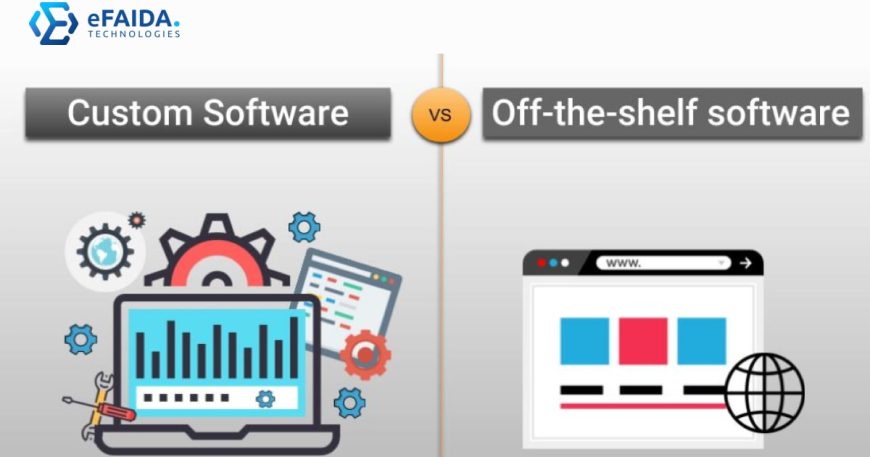Introduction
When it comes to competitiveness and profitability, the choice of appropriate software is even more crucial for modern digital business, as the digital environment is fast-moving. Exploring and realizing the disparities between custom and pre-out-of-the-box software knowledge is vital to making an informed decision that would match your business goals.
Definition of Custom Software
The name reflects that this type of software is tailor-made for specific business needs in other words, instead of using something that was developed for a broader consumer, it is made specifically to meet certain requirements of a business. It is modeled to be able to fit the specific work conditions and regulations within an organization – this is a highly specific and controllable level of degree.
Definition of Off-the-Shelf Software
While off-the-shelf software is a term used for pre-packaged solutions ready for implementation through purchase or subscription, it is also important for organizations to understand their unique challenges and come up with tailor-made software solutions. Hence, this line is planned for a wider target market, and consumer individualization is a necessity probably at a minimum.
Review on the Need to Pick an Appropriate Software Variety,
Moreover, the software you select can have a huge impact on the efficiency and productivity of your company, much as it may be its success or failure. In a nutshell, it is crucial to consider both the benefits and drawbacks of the custom-made and off-the-shelf software versions to make sure that they are in line with your enduring perspectives.

Cost Considerations
Initial Investment
While the custom software may come at a steep upfront cost, it is vital to know whether such an investment is worth it looking at how much lower the long-term costs may be. The initial cost, which is contemplated for custom software, is the main element that is different from software that is available on the shelf. They give off the impression that they cost more.
Maintenance and Upkeep
The maintenance costs of the bespoke software can be substantial over the longer term as well due to the need for regular updates by the rapidly changing business requirements. The changeable software is allowed to be bought off that line with the readymade pieces, which later can be changed on and on due to the services that help to improve the maintenance.
Scalability and Flexibility
Apart from that the software system’s capability to accommodate and rescale the expanse of the areas is another factor. Companies can easily scale and modify the custom software to match growth and other changes within their business, but the out-of-the-box software might not be adjusted to particular requirements and lack the scalability needed to support the business.

Customization Options
Tailored Solutions
A major perk of developing your custom software is the opportunity to develop a solution tailored entirely to your business needs. On this note, this level of tailoring may eventually lead to increased production, efficiency, and contentment of consumers.
Unique Features
Custom-written software gives your business the option to incorporate customized features and functions that satisfy your business’s specific requirements. You can set yourself apart from others and improve your overall running of business.
Integration Capabilities
Through custom software, it is possible to achieve uninterrupted connection between already installed systems as well as third-party applications for more whole IT network. These not only help to market the brand but also generate more informative and easier processes, better communication, and enhance overall business performance.

Implementation Process
Timeframe for Development
There are not many similarities between a custom software development roadmap and how the vision can be implemented. They vary from the level of complexity of the project and the volume of work that has to be done. It is key to having a clear development procedure and a defined timeline so that this is not a delay in implementation.
Training and Onboarding
The training and onboarding techniques required for the success of the new software solutions are crutches. Users of custom software may have to get more in-depth so that they can get the hang of the new features and tools, whereas the training of off-the-shelf software often tends to consist of standardized manuals.
Technical Support and Updates
Selecting the proper software solution among many entails assessing the presence of technical support and middle-town class icrums.com’s regular updates. Custom software developers that bring individual assistance, as well as upgrades, are usually available with tailor-made support that addresses special needs as opposed to generic support services offered by off-the-shelf software developers.

Compatibility and Integration
Smooth Overcrete This Platform with the Current Systems
The compatibility with the current systems has to be given priority, to have a seamless transition to the new software. Custom software is a convenient option when you do not want your software to clash with your existing hardware setup and that might be required on general software packages while they are to be made to run in your system.
Interoperability with Third-Party Apps
Involving third-party applications is a factor that will help in increasing features and making productivity rich. Custom software may be more flexible concerning interoperability, thereby giving you the ability to benefit from an even more extensive range of programs and services.
Adaptability in Turning Complex Scenarios.
As the IT environment of your business changes, the software that you use may require modifications as well. Bespoke solutions offer the agility to tailor not only to your organization but also to changes made by it in line with its growth, off-the-shelf products have limited scalability and may not adapt effectively to such changes.
Conclusion
Summary of Key Points
A company that produces customized software or off-the-shelf software must evaluate factors like cost, level of customization, implementation process, compatibility, and integration. It is equally important to evaluate the pros and cons of every type of software program before choosing your business.
Concluding Ideas of Picking the Greatest Selection of Your Business
Finally, the choice between custom-made and off-the-shelf software is determined by your individual needs and strategic objectives. Analyzing these factors attentively and going into the long-term impact, the right decision that matches your business objectives shall be achieved.
FAQs on Custom vs Off-the-Shelf Software
Q1. Which way would be most suitable to determine if custom software is the one for my business development?
To make the final decision on custom software development for your business, consider factors that require a solution to specific business needs and goals, adaptability and scaling, budget and resource availability, and long-term outcomes comparison with ready-made solutions.
Q2. Which of the off-the-shelf software products’ pros do we consider a priority?
When deciding among the ready-to-use software products the decisive factors include the cost-effectiveness of the option, simplicity of its implementation, and the compatibility of the chosen product with the already existing systems as well as the features the product has to offer and the customer support you can count on. Partner with a product that meets your specific corporate needs and that is most competitive within its price bracket among its competitors.
Q3. Does a custom extension that can be used in place of off-the-shelf software have a future option?
It is possible to implement a custom extension that works in place of pre-built software if it is developed, consistently updated, and meets the later necessities of your business. Look at characteristics like scalability, flexibility, cost-effectiveness, and the ability to plug into existing systems when assessing the future pace of growth of an individual extension.
Recognize that the final decision between bespoke and pre-packaged programming exactly depends on what differentials your organization has and what it aims to attain. Be sure to ponder deeply on all aspects to arrive at an appropriate conclusion.




